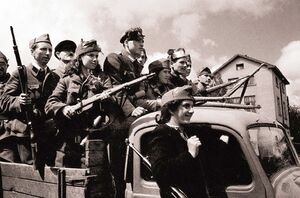Jedorian Revolution
| Jedorian Revolution | |||||||
|---|---|---|---|---|---|---|---|
 Jedorian Revolutionaries | |||||||
| |||||||
| Belligerents | |||||||
|
Jedorian Communist Party National Army of Workers |
Confederation of Jedoria Royal Confederate Army | ||||||
| Commanders and leaders | |||||||
| Aleksis Kraulis | Some dude | ||||||
| Strength | |||||||
| 350,000 militia, soldiers, and supporters | 125,000 troops | ||||||
| Casualties and losses | |||||||
| ~25,000 |
4,000 killed 10,000 wounded | ||||||
The Jedorian Revolution (also known as the Communist Revolt) was a revolution in Jedoria led by the Jedorian Communist Party against the government of the Confederation of Jedoria. The revolution was a culmination of years of political and economic instability in Jedoria, exasperated by growing income inequality and the aftermath of Jedoria's defeat in the Northern War.
Led by Aleksis Kraulis, the Jedorian Communist Party had steadily grown in strength in the years following the Northern War, eventually reaching nearly 1 million members in 1953. By that point much of northern Jedoria, largely under the control of the Bessarabian Dominion, had become a hotbed of communist sympathizers and supporters, resulting in frequent strikes and protests demanding better working conditions and wages for Jedoria's many industrial workers and miners. In the spring of 1954 Kraulis called for a national strike which was adhered to by nearly 2 million workers throughout Jedoria, bringing the country to a standstill. Decades of political imbalance in the Confederation meant that the principle power in Jedorian politics was Bessarabia, but plagued by protests the Dominion was largely powerless to restore order. Defections of law enforcement and military personnel further weakened the local government, and in May members of the National Army of Workers stormed the Bessarabian Congress, capturing and killing many public officials. Shortly thereafter Kraulis declared the foundation of a communist soceity in northern Jedoria, and offered admission to the rest of the country.
The High Council, the governing body of the Confederation, immediately mobilized the Royal Confederate Army to put down the uprising, but plagued with internal divisions and uncertainty the Confederation's response was weak and ineffective. After it became clear that the rest of the country would not follow suit, Kraulis ordered his forces to march south to "liberate" the rest of Jedoria. In a series of short battles in the Radstadt the demoralized RCA was routed and the communists were able to seize control of southern Jedoria with ease. On 3 August 1954 Kraulis declared the foundation of the Socialist Republic of Jedoria, ending the revolution.